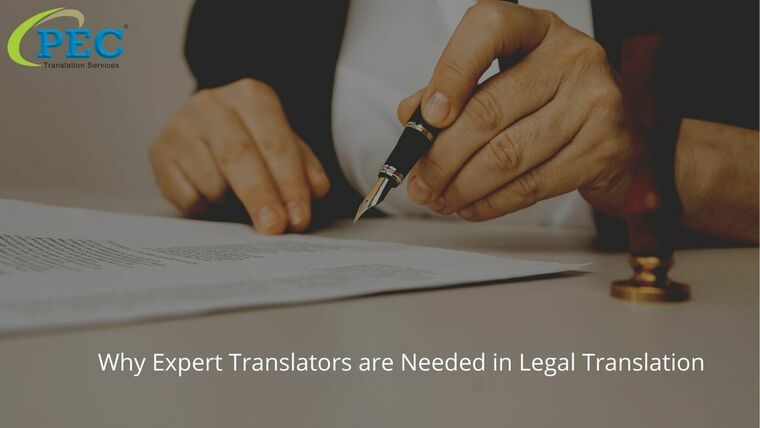In law, everything revolves around what you speak and write. The future of the argument is completely dependent on the proof and the statements made by the lawyer. When in a foreign land, it becomes crucial to put up your side in front of the judiciary. Because you do not understand the language. This is when you will need an expert legal translator to help you get out of the situation. Many courts want proof or any other type of legal content to be translated into the native language. There is less value to the content that is not in the understandable language of the court.
Translations of texts used in legislation are called Legal translations. For legal purposes, documents must be made available in the official language used in a particular jurisdiction. Thus, legal translations include a variety of materials from court documents to patent identity documents, contracts, financials, records, and more. Legal translations may include translations of case-related documents. Some of them are likely to text messages, emails, bank statements, and documents from abroad. A variety of law enforcement agencies, including courts and immigration, are in need of legal translations. Other groups in need of legal translation include corporations, patent and trademark applicants, realtors, property owners, and educational institutions.
The language of the legal profession is highly accurate and error-free. Therefore, court translations require professional translators. Trust is very valuable, especially in the legal industry. If one speaks the same language as their clients, that's one way to gain and maintain their trust. Hiring a freelance translator without the necessary legal knowledge can affect your future when translating documents by stale or even worse, bilingual colleagues. If you are dealing with legal texts, you do not have sufficient knowledge of the target language. Translators need to understand the legal terms to translate correctly.

Even simple documents such as educational records, birth certificates, marriage certificates, etc. may be rejected for containing spelling errors and typos. Therefore, our full-text court interpreters will review the translated documents for errors by professional revisionists. Without freelance translators and bilingual staff being able to edit and proofread documents with the second eye of an expert, mistakes are likely to get caught in the net. Legal clients need advice and information in their native language and it is important that legal documents continue to be true to the original documents. It is important that the legal text and integrity of the translated content are maintained at all times.
Except for exemplary linguistic and cultural skills, court interpreters must have advanced training. They must be legal professionals of a certain kind and must have the necessary experience in the handling of documents related to their field of specialization. A particular organization must be able to handle highly sensitive and confidential documents and provide high-quality translations that meet the demanding needs of its clients.
Although legal translation is very difficult and tricky. Accuracy of translation is essential. All subtleties found in the source document are legally understood regardless of the language in which the document was translated because it must be captured and translated without losing the integrity of the original document. Because laws vary from country to country, only experienced translators with expertise in a specific legal field should be responsible for translating legal documents. Forensic translators must be native speakers because they have a greater knowledge and understanding of their native language compared to those who speak it only as a second language.
A college degree is required for legal translation. Although not required, it is advantageous to have a graduate or master's degree in legal translation, language, or the law.
Legal translation requires the ability to absorb, understand and participate in complex legal texts. These characteristics help to effectively convey the required translations based on the criteria set by the client. Legal translators must be experts in legal systems in at least two countries.
Translators often work under pressure, especially in court translations. In many cases, the duration of work is very short, and clients expect fast delivery times. There are also a lot of risks, so not many want to be legitimate translators. There is no room for error, as mistranslations can have very negative effects. There should be no ambiguity in the translation either. Everything needs to be very clear. Professional legal translators need to be very fluent in at least two languages and have special knowledge of various legal system areas in other countries. If the legal translation one hires has an extensive knowledge of not only local law but also cultural differences then that will be even more personal.
Law translations are not limited to court cases, so translators' expertise is expressed in their ability to properly analyze and contextualize the law between two different systems. This shows that the translation knowledge base is broad and up-to-date. If legal documents are suspected of legality, small translation errors and accidentally, large problems can occur. Lawyers and other professionals can try to choose a syntax or individual word to question the intent of a legal document.
Localization plays an important role in producing hawk-like legal translations that are monitored by a foreign audience. Localization complements legal translation by preventing unintended translations from occurring due to unlocalized languages in the region where the document is received. In the absence of localization, harmless phrases and words used in legal translation contain unintended political and cultural meanings to offend recipients or completely discredit legal documents. It can be used.
Depending on the type of legal document translated and the type of error that occurred during the translation, inaccuracies can have serious consequences for individuals and businesses. Financial punishment for a person or any business due to these translation errors can face court disputes, proceedings, and/or criminal accusations. At best, these mistakes require resubmitting new translations of these documents, which can be materially costly in the form of penalties and/or delays. In severe cases, one can also face lost business opportunities, legal judgment, and imprisonment. Given these risks, it becomes important for individuals and businesses for having ample incentives to find qualified and certified translators who can process these legal documents and provide reliable results. For organizations and individuals who receive these documents, legal translation services simplify the processing of the documents, eliminate problems that can interfere with business processes, increase the risk of refusal to apply, and result from incorrect translations. False errors can also cause additional legal issues.
Legal translations are very demanding in today's business world. As many companies are increasingly developing and exploring new markets in different parts of the world, both business contracts, as well as the volume of clerical processing, require the expertise of forensic translators in many respects.
posted on 23 Aug, 2021. Posted In translation.
